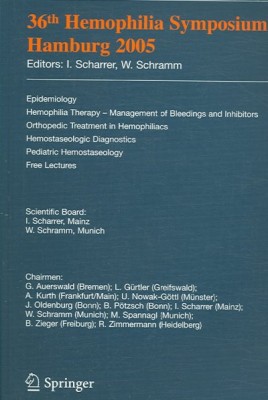| 36th Hemophilia Symposium Hamburg 2005: Epidemiology; Hemophilia Therapy - Management of Bleedings and Inhibitors; Orthopedic Treatment in Hemophiliac 2007 Edition Contributor(s): Auerswald, G. (Other), Scharrer, Inge (Editor), Kurth, A. (Other) |
|
 |
ISBN: 3540367144 ISBN-13: 9783540367147 Publisher: Springer OUR PRICE: $161.49 Product Type: Paperback Published: November 2006 |
| Additional Information |
| BISAC Categories: - Medical | Hematology - Medical | Orthopedics - Medical | Pediatrics |
| Dewey: 362.196 |
| LCCN: 2006929905 |
| Physical Information: 0.53" H x 6.23" W x 9.12" (1.11 lbs) 319 pages |
| Descriptions, Reviews, Etc. |
| Publisher Description: About 31% of the patients with a factor VIII replacement therapy develop a factor VIII inhibitor.From these are 23% low-responder ( 5BE) 8].In the case of severe hemophilia B, about 10.5% of the patients develop inhibitory antibodies 9]. Anti-factor VIII-antibodies are also seen in 15-78% healthy people without hemophilia 7, 17, 19]. Lacroix-Desmazes et al. 10, 11] showed anti-idiotypic antibodies neutralizing the inhibitory activity of the an- factor VIII antibodies in healthy people. Well-known predisposing factors for inhibitor formation are genetic features of factor VIII, which include large deletions, nonsense mutations or intrachromosomal recombinations 5, 23].Also, ethnic groups other than Caucasians (e.g.Africans) have a higher risk of developing inhibitors.Other risk factors are presumably de- ved from the immune system. For instance, a reduction of the inhibitor was seen with lower CD4+ T helper cell counts in HIV positive hemophilic patients 3,4].The development of inhibitors is very likely to be a Th-2 mediated event where cyto- nes and their receptors, T-cell receptors and the Major Histocompatibility Complex may also play an important role. Theoretical Background The substituted factor is an unknown protein for patients with a severe he- philia. Fig. 1. The normal immunoresponse (according to BAENKLER 2]) Abbreviations: TCR - T cell-receptor; APC - antigen presenting cell 36 I.Wieland et al. |